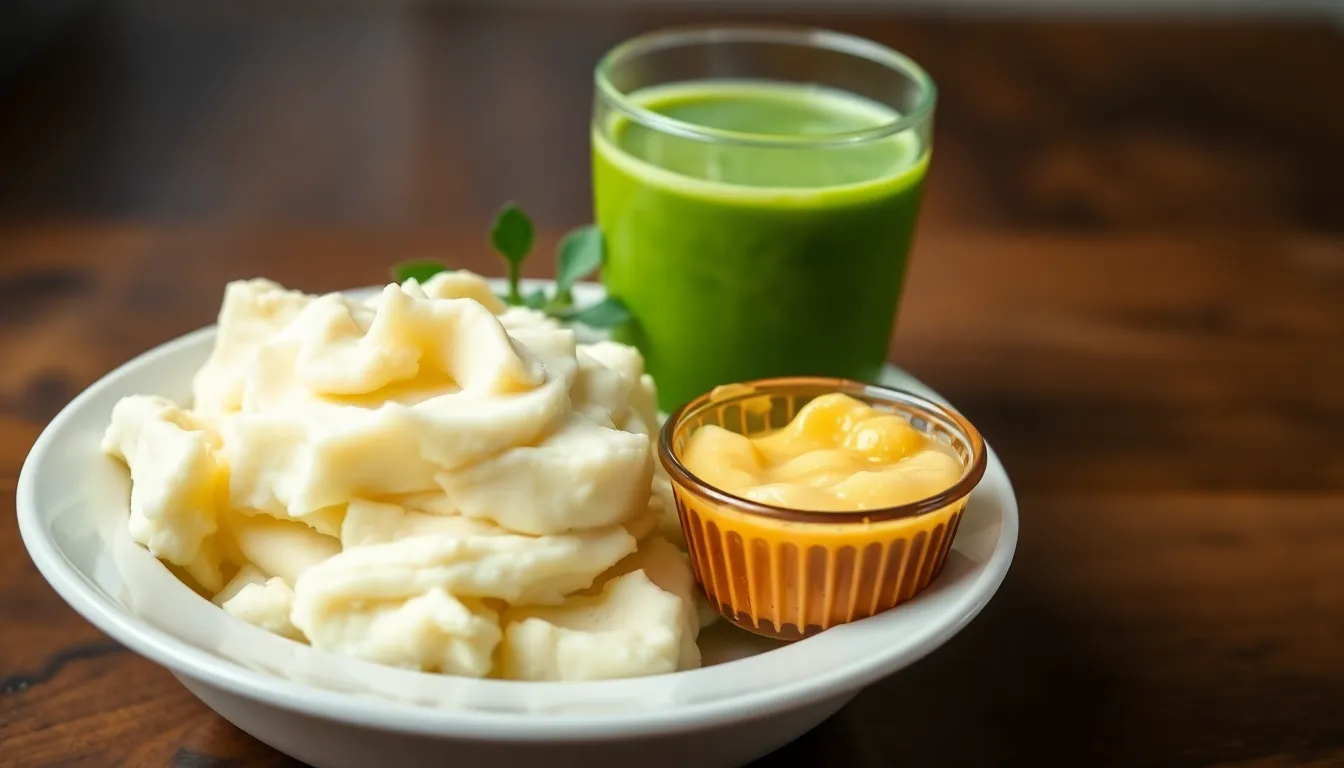Table of Contents
ToggleSurviving wisdom teeth surgery is no small feat. As if dealing with the aftermath of dental drama isn’t enough, the real challenge lies in figuring out what to eat. Forget the days of chomping on your favorite crunchy snacks; it’s time to embrace the soft food revolution.
Importance Of Choosing The Right Foods
Selecting appropriate foods post-surgery is crucial for a smooth recovery. Foods can significantly influence healing and comfort levels during this time.
Nutritional Considerations
Nutritional value plays a vital role in the healing process. Soft foods rich in vitamins and minerals support immune function and tissue repair. Foods like mashed potatoes, smoothies, and yogurt provide necessary calories without risk of irritation. Protein-rich items, such as scrambled eggs and pureed beans, reinforce muscle recovery. Avoiding hard or spicy foods is essential, as they can cause pain and delay healing. Staying hydrated is equally important, ensuring that recovery remains on track.
Recovery Process
The body requires specific nutrients to recover effectively after wisdom teeth removal. Consuming the right foods promotes quicker swelling reduction and minimizes discomfort. Soft foods allow for easier chewing and swallowing, preventing stress on healing gums. Gradual reintroduction of solid foods can occur as discomfort decreases. Following a balanced diet rich in soft foods helps ensure adequate energy levels. Choosing nutrient-dense foods fosters healing, making recovery smoother and more efficient.
Best Foods To Eat After Wisdom Teeth Surgery

Choosing the right foods after wisdom teeth surgery plays a crucial role in recovery. Soft foods, nutritious smoothies, and hydrating liquids are essential for healing.
Soft Foods
Soft foods provide comfort during recovery. Items like mashed potatoes, applesauce, and pudding deliver necessary calories while minimizing discomfort. Additionally, scrambled eggs contain protein, aiding muscle repair. Consider incorporating oatmeal, which offers fibers that are gentle on the digestive system. Avoid foods that require chewing, as they can irritate the surgical sites. A focus on smooth textures helps facilitate easier swallowing and promotes less inflammation.
Nutritious Smoothies
Nutritious smoothies serve as an excellent post-surgery option. Blending fruits and vegetables creates a nutrient-rich meal that promotes healing. Incorporating Greek yogurt or protein powder boosts protein intake, essential for recovery. Spinach, bananas, and berries can enhance the vitamin and mineral content. Make sure to avoid added sugars to keep the smoothies healthy. Remember to use a straw cautiously, as suction might dislodge blood clots, slowing healing.
Hydrating Liquids
Hydrating liquids are vital for maintaining fluid intake and supporting recovery. Water, herbal tea, and clear broths prevent dehydration, crucial during this period. Electrolyte drinks can help replenish essential minerals lost during surgery. Choose soups without chunks to maintain softness while providing nourishment. While hydration is important, avoid beverages with acidity, like orange juice, as they can irritate the surgical areas. Sipping on nourishing liquids aids in comfort and ensures efficient healing.
Foods To Avoid Post-Surgery
Certain foods can hinder the healing process after wisdom teeth surgery. Identifying which items to avoid helps ensure comfort and speedy recovery.
Hard and Crunchy Foods
Hard and crunchy foods pose a significant risk post-surgery. Foods like nuts, chips, and hard candies can irritate the tender areas of the mouth. Chewing these items might lead to pain or even dislodge blood clots necessary for healing. Fresh vegetables and crusty bread also fall into this category, as they require extensive chewing, which can strain jaw muscles. Opting for soft alternatives instead supports recovery by reducing stress on surgical sites.
Spicy and Acidic Foods
Spicy and acidic foods can aggravate sensitive tissues post-surgery. Items such as hot sauces, citrus fruits, and vinegar-based dressings introduce irritation and pain. These foods often lead to increased inflammation, potentially delaying healing. Additionally, garlic and onion may produce discomfort due to their strong flavors. Choosing mild options lessens the chance of adverse reactions, allowing for a smoother recovery without unnecessary complications.
Tips For A Smooth Recovery
Following wisdom teeth surgery, proper care and dietary choices significantly help recovery. Focusing on meal preparation and hydration supports healing.
Meal Preparation Ideas
Preparing meals ahead reduces stress during recovery. Soft foods like mashed potatoes, yogurt, and oatmeal fit seamlessly into a healing diet. Blending fruits and vegetables creates nutritious smoothies, which offer essential vitamins and proteins. Cooking eggs into a fluffy scramble provides a protein-rich option. Using simple recipes keeps food preparation manageable. Soups, especially pureed varieties, deliver both nourishment and comfort. Keep meals at room temperature to avoid irritation. Simple meal components allow for variation and prevent boredom during this dietary transition.
Staying Hydrated
Hydration plays a critical role in recovering from surgery. Drinking plenty of water helps maintain optimal fluid levels. Herbal teas offer soothing options while providing warmth and hydration. Clear broths deliver essential liquids along with nutrients. Avoiding caffeinated and sugary drinks prevents irritation of sensitive tissues. Sipping water regularly maintains hydration without overwhelming the mouth. Taking small, frequent drinks keeps moisture levels consistent, supporting overall health. Sticking to mild options creates a comfortable drinking experience. Prioritizing hydration supports tissue healing and enhances comfort during recovery.
Recovering from wisdom teeth surgery requires careful attention to diet. Choosing the right soft foods can make a significant difference in comfort and healing. Nutrient-rich options like smoothies and yogurt not only provide essential calories but also support recovery. Staying hydrated is equally important to facilitate healing and maintain overall well-being.
By avoiding hard and spicy foods, individuals can minimize discomfort and promote a smoother recovery process. With thoughtful meal preparation and a focus on soft, nourishing foods, transitioning back to a regular diet becomes easier. Prioritizing these dietary choices ensures a quicker return to normal activities and enhances the overall recovery experience.




